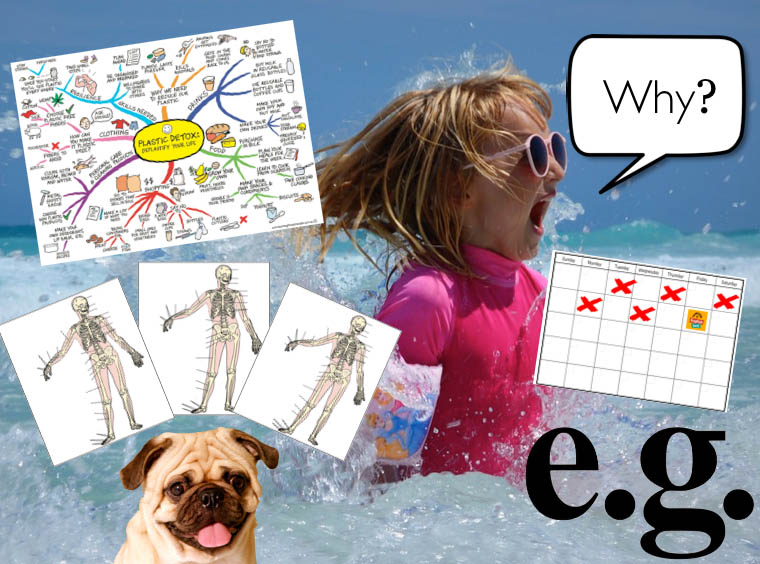
If you want to achieve solid marks at school, you need to be strategic. Ditch your highlighter pens. Stop re-reading your books and notes. These are incredibly boring and passive ways to study. You need new study strategies.
Dual coding is when you use both words and pictures to learn information. This gives you two ways to learn the information (via the words and the pictures).
Here are some different ways you can dual code when you study:
Is the picture conveying something that the text isn’t?
Think this strategy is only for visual learners and artistic types? Think again. Dual coding has nothing to do with learning styles and being a visual learner, which some people argue is an educational myth. Dual coding is for everyone.
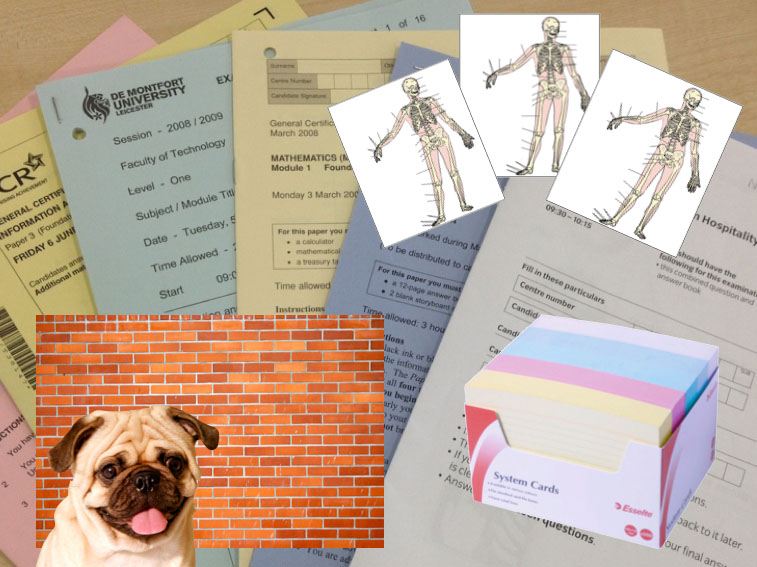
Without looking at your books and notes, try to recall the information. Ask yourself, What did I study in human biology yesterday? Force yourself to get the information out of your brain.
The simple act of bringing information to mind helps to reinforce it in your brain.
You see, it takes effort to transfer information into your long-term memory. You don’t just hear information once in class and … BOOM! That information stays in your brain forever. Sorry, it doesn’t work like that.
We are incredibly forgetful so we need to revisit the information to help cement it in our brains. Retrieval practice is the best way to do this.
Let me make one thing clear: Retrieval practice is not the same thing as repetition.
Repetition is easy (you just read the information over and over again). But retrieval (forcing yourself to bring specific information to mind) is hard. It strains your brain. But it’s a good kind of muscular strain.
Just like it’s good to push your body at the gym, retrieval practice is the ultimate workout for your brain. It will help shift information into your long-term memory so you can access it when you need it.
Here are some different ways you can practice retrieval:
When you get to the point where you can’t recall anything else, that’s when it’s okay to take out your books and your notes. Check for any mistakes and gaps in your knowledge.
As Dr Barbara Oakley says:
“Getting clear on what you don’t understand is 80% of the battle.”
It’s also important to know that you’re retrieving the correct information (otherwise, you’ll be reinforcing the wrong stuff!).
If you’re consistent with your retrieval practice and incorporate it into your study sessions, you’ll see dramatic improvements over time.
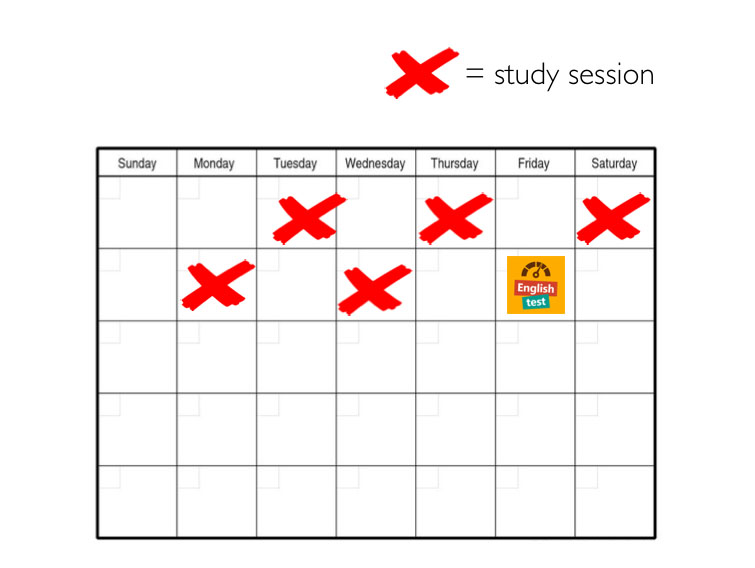
Rather than doing 5 hours of study right before your exam (i.e. cramming), it’s much more effective to space out those 5 hours of study over 2 weeks. You learn more by spacing out your study.
Now if you’re used to the cramming approach, spreading out your study over 2 weeks will probably feel strange at first. It will require a little planning. But the more you do this, the easier it gets. Before you know it, it will become a habit.
When you sit down to do spaced practice, keep in mind you only need to do 15-20 minutes of study before taking a break (not hours and hours of study).
The spaced practice approach usually means you’ll:
Why? Because you won’t need to stay up late or pull an all-nighter to study for your test or exam.

Have you ever spent time with a 4-year-old child? If so, you’ll notice they ask Why? a lot. It’s this natural curiosity that makes 4-year-olds like sponges, soaking up information from absolutely everywhere.
When you sit down to read your textbook, you want to ask Why? and How?
Ask questions such as:
Asking questions will help you to stay engaged with the material.

For some subjects (e.g. economics and psychology) you’ll need to learn lots of definitions of abstract ideas and concepts. If you’re like most students, you probably memorise these definitions by repeating them over and over again.
But if you do this, two things are likely to happen:
1) You’ll probably feel like a robot; and
2) You won’t fully understand the concept, which will make it hard to remember.
We can get ideas on how to learn definitions more effectively by looking at how professional actors learn their lines. Professional actors don’t learn their lines word for word. Instead they try to understand the character’s motivations and needs. Gaining a deeper understanding of these factors helps the actor to learn their lines more efficiently.
Similarly, gaining a deeper understanding of an abstract concept will help you to learn and memorise it. So the question is, what is going to help you to deeply understand the abstract concept?
Good examples. And lots of them.
Whenever you have to memorise an abstract concept, collect as many different examples as possible. Get examples from your teachers, from your textbooks, etc. Plaster those examples over your wall and in key locations in your house (e.g. on the mirror and fridge).
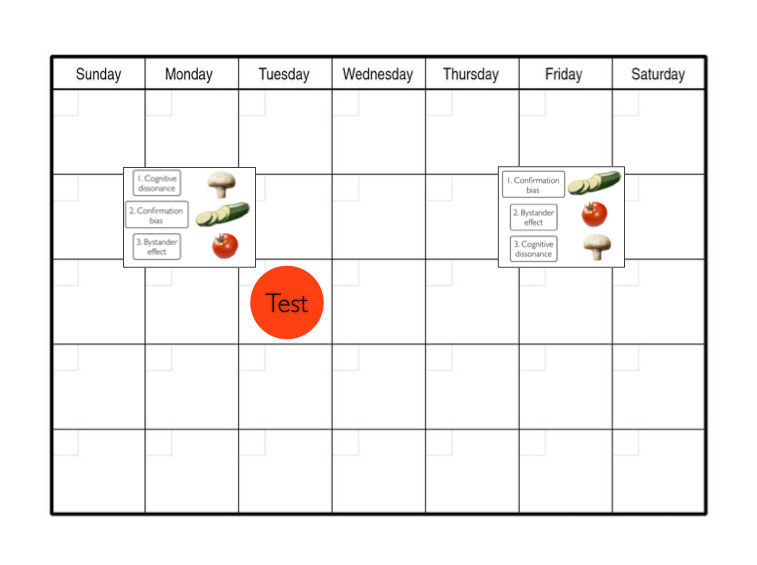
a) Ideas
If you were going to a barbeque, you wouldn’t bring along veggie kebabs that only contained zucchini on the skewer. That would look cheap and nasty! One of the joys of kebabs is the variety of vegetables (e.g. tomato, onion, zucchini, capsicum). So you’d want to mix things up to make the kebabs appetising.
The same thing applies with your studies. Don’t just study one concept for a long period of time. Mix things up. Study one idea and then jump to another concept in the same subject.
For extra bonus points, you could pretend to be 4-years-old and ask yourself, How are these two ideas similar? and How are they different?
b) Location
Don’t always study in the same place. Sometimes study in a quiet café, a library or at the kitchen table. Research has found that changing your surrounding environment slows down forgetting and enriches learning.
7. Take notes by hand

Want to remember more information? Ditch your laptop and work with pen and paper.
A study called The pen is mightier than the keyboard found that students retained more information when they took notes by hand than when they took typed notes on their laptops.
When you take notes on your laptop, you tend to write word for word what the teacher is saying. This is because you can type at the same speed the teacher is speaking at.
But when you take notes by hand, you can’t write as fast as the teacher speaks. This forces you to put the information in your own words. This makes it easier for you to understand the information, which explains why you tend to remember more of it.

Why is it that some people with dementia can’t remember the names of their friends and family, but they can remember the lyrics to hundreds of songs?
It’s because music touches many different regions and lobes of the brain, which helps to cement the lyrics into our brains.
This makes music an incredibly powerful learning tool. Certain types of music can motivate you to study and complete tasks that you typically perceive painful and would prefer to avoid doing.
But more importantly, music can also help you to learn important concepts.
Jump on YouTube and you’ll find a range of educational songs (check out the circulatory song Pump it up! and this quadratic formula song. You can even learn how to make a lasagna with music.
Here are some ideas on how you can use music to help you study:
Have some fun and use humour wherever possible.

Working on a difficult problem? Feeling stuck? Then take a break. Allow your brain to go into what Dr Barbara Oakley calls the ‘diffuse mode’ of thinking.
In the diffuse mode, you relax your attention and allow your mind to wander. Let your subconscious mind do the work for you.
You often hear stories of famous scholars coming up with groundbreaking theories while relaxing under an apple tree, going for a walk or having a shower. In these diffuse mode states, their brains are still working away on the problem, which ultimately leads to these ‘Eureka!’ moments.
Some activities that will help you to enter the diffuse mode of thinking are:
It may seem like you’re wasting time in the diffuse mode but you’re not. Your brain is still working quietly in the background on the problem, even though you’re not actively focusing on it.

Okay, so this isn’t exactly a specific study strategy but it’s critical to all of the strategies listed above. You see, when you sleep, your brain doesn’t just turn off. The opposite actually occurs. Your brain gets busy doing the following:
This is why going over important information before you take a 90-minute nap or go to sleep at night can be beneficial for learning. Your brain is more likely to rehearse this information and strengthen it while you sleep.
Most importantly, it’s critical that you get a solid 8-10 hours of quality (undisturbed) sleep each night. If you’re sleep deprived, these effective study strategies cease to be effective.
Getting sufficient sleep will ensure that you can concentrate and recall information more easily in your tests and exams. So if it’s approaching midnight and you’re thinking, Maybe I can squeeze in another hour of study … think again. Always prioritise sleep over study. Your brain will thank you for it the next day.
To get maximum benefit from these ten study strategies, you need to be able to focus when you use them. Why? Because distraction is the enemy when it comes to learning information. If you’re trying to study complex information while checking your phone and watching a Netflix series, you’re wasting your time.
So before you sit down to study, deal with any potential distractions. Do this …

Turn your phone off. Place it in another room far, far away. Close your bedroom door so you can’t be disturbed.
The aim of the game is to form effective study habits. This isn’t hard to do and it’s never too late to give it a shot. It just takes practice, perseverance and being willing to try something new.
Share This:

While I always kept an eye on the amount of petrol in the tank, I also needed to pay close attention to my own personal energy levels.
It was important to avoid pushing myself past empty and depleting my energy reserves because if I did, I would end up feeling emotionally wrecked.
I clearly remember one day when I pushed myself too hard. Looking back, it seems comical now. But I wasn’t laughing at the time.
It was my 24th birthday. I had woken up that morning with great intentions, thinking “It’s my birthday! Let’s make it a great day!”
I was trying too hard to make it a “great day”. I was forcing it, and perhaps that’s partly why everything went pear-shaped. Here’s what happened . . .
I had a school presentation later that day, so I spent the morning preparing for it before driving over an hour to deliver the presentation.
The time slot for the talk wasn’t ideal—my talk was scheduled for the last period on a Friday afternoon—but I was thinking, “Hey! It’s my birthday. Let’s make it a great day!”
What can I say?
The session didn’t go well.
There were IT issues and the students’ minds were elsewhere. But you couldn’t blame the students. They were tired and I was the only thing standing between them and the weekend.
When I wrapped up the session, I felt tired and hungry.
But I foolishly ignored my body’s needs. On an empty stomach, I began the long drive home. I was desperate to get back and be in my own space.
Within 10 minutes, I found myself stuck in peak-hour traffic. But I wasn’t just stuck in traffic; I was also stuck in an anxiety loop.
Psychologist Risa Williams explains an anxiety loop as “a negative thought cycle that makes you feel stuck in a rut”. You can’t rationalise your way out of an anxiety loop. Logic doesn’t cut it.
I kept thinking about how the talk could have gone better, why my birthday had been such a flop . . . these annoying tunes kept playing over and over in my mind and they kept getting louder and louder.
I was about halfway home when something unexpected happened: I began sobbing uncontrollably behind the wheel of my car. I just felt incredibly sad.

I realised it was dangerous to drive while crying, so I pulled over and called my mum.
My mum and I would chat on the phone most days, but I remember this conversation especially well because my mum didn’t pull any punches.
Mum: What’s wrong Jane? Why are you upset?
Me: It’s my birthday and I wanted to have a great day but I just feel so awful. Everything has gone wrong today. The day has been a total flop.
Mum: Jane, have you had anything to eat?
Me: No.
Mum: You’re hungry! I know what you’re like when you’re hungry. You need to find a place to eat.
Me: But there’s nothing healthy to eat around here . . . there are no healthy options.
Mum: I don’t care. Order something. Anything. You need to eat. Go do that right now!
I found a café that was still open (it was 3:30pm) and ordered a burger from the menu.
When the burger came out 10 minutes later, I felt emotionally wrecked.
But after eating that big, juicy burger, I felt instantly better.

The world now felt like a new and different place. I had strength again. With tear-free eyes, a calm mind, and more energy in my system, I got in my car and drove myself home safely.
That experience taught me an important lesson. I learnt I had to stop pushing myself past the point of empty (something I’d done far too often for too many years).
I had to start listening to my body and the signals it was sending me.
Feeling hungry? Have a healthy snack.
Tired? Take a quick nap.
Thirsty? Have a few sips of water.
Sitting for too long and in pain? Get up and move.
Eyes and brain hurting from staring at a screen for too long? Take a break and look out the window.
It also taught me how engaging in small behaviours (tiny habits) can significantly impact how you think and feel.
All of these habits are designed to boost and conserve my energy. That’s the great thing about habits: they conserve your energy by automating your behaviour and combating decision fatigue. As Kevin Kelly states in his book Excellent Advice for Living:
“The purpose of a habit is to remove that action from self-negotiation. You no longer expend energy deciding whether to do it. You just do it.”

These 15 tiny habits are so deeply ingrained that I do all of them most days. I don’t waste time and energy thinking, “Should I go on the treadmill or stay in bed and read a book?” or “Do I do my gratitude practice or eat breakfast?” I have established a routine of healthy behaviours that work for me.
These tiny habits don’t take long to do, and best of all, they stop me from running out of energy and crashing. I also haven’t been sick in over three years (mainly due to Habit #13: Wearing a n95 mask).
You might be wondering why I’m still wearing a mask when covid restrictions have eased. There are a few reasons: I know several people with long covid (and they are suffering). Their quality of life is not what it once was.
I’ve also read a lot of the research on covid. Research shows covid can cause significant changes in brain structure and function.
This study found that people who had a mild covid infection showed cognitive decline equivalent to a three-point loss in IQ and reinfection resulted in an additional two-point loss in IQ.
Other studies have found covid can disrupt the blood brain barrier and cause inflammation of the brain. Since I rely on my brain to do everything, wearing a n95 mask (not a cloth or surgical mask) is a simple and effective habit I’m happy to keep up to protect my brain and body.
At the end of the day, cultivating healthy habits is about noticing the little (and big) things that make a difference and then experimenting with those things.
For example, Habit #3 (Moving on a treadmill first thing every morning) came about when I noticed the dramatic difference in how I felt on the days I ran on the treadmill compared to the days I didn’t (I felt mildly depressed on the days when I didn’t go for a run).
Habit #4 emerged after I noticed that eating a particular breakfast (overnight oats with berries) made me feel amazingly good compared to having a smoothie or a bowl of processed cereal for breakfast (which would spike my blood sugar levels).
Your health influences everything in life—and I mean absolutely everything. It influences how you interact with the people in your life, how well you learn and focus, your energy levels, and how you do your work.
As Robin Sharma explains in his book The Wealth Money Can’t Buy, health is a form of wealth.

Sharma writes:
“If you don’t feel good physically, mentally, emotionally, and spiritually, all the money, possessions and fame in the world mean nothing. Lose your wellness (which I pray you never will) and I promise you that you’ll spend the rest of your days trying to get it back.”
One way you can build your wealth is by cultivating tiny healthy habits.
As I think back to my younger self, 24 years old and ignoring the warning signs my body was sending me, I can’t help but feel a bit embarrassed. But as Kevin Kelly says, “If you are not embarrassed by your past self, you have probably not grown up”.
I’ve grown up a lot. I’ve come to realise developing awareness and taking time out to step back and reflect are critical to living a healthy, grounded life. When you notice what makes you feel good and not so good, you can make tiny tweaks to improve your life.
If you aim to do more of the things that leave you feeling good and less of the things that leave you feeling depleted and fatigued, you can’t really go wrong.
In the words of Psychologist Dr Faith Harper, “Keeping our brains healthy and holding centre is a radical act of self-care”.
On that note, take a moment to check in with your body. What does it need right now? Could you do something small to treat your body and mind with a little more care? Step away from the screen and do it now.
This usually comes with shiny new pens, fresh notebooks and renewed hope and optimism. But I recently heard someone say:
“I can’t believe it’s already the end of January . . . so much has happened. I feel tired.”
Can you relate?
A lot has been happening in the world. It’s easy to feel overwhelmed by the news, let alone the tsunami of information we’re bombarded with online.
If you’re feeling overwhelmed and tired (like many people are), let’s try to make life a little easier for ourselves. In this article, I share a strategy you can use to make difficult things feel easier to do. I also share how you can apply the strategy to studying challenging subjects.
I remember having a brief conversation with a year 11 student at the start of the pandemic. It went something like this . . .
Me: How are you feeling given the situation (i.e., COVID-19)?
Year 11 Student: Some of us are stressed but not because of COVID. It’s because of what our teachers have just said to us.
Me: What have your teachers been saying to you?
Year 11 Student: They keep saying this year is going to be really hard. The subjects are going to be much, much harder.
Driving home from the talk, I couldn’t stop thinking about what this student had said as well as the worried look in her eyes.
Here’s what happened . . .
I was booked to deliver a presentation to 150 year 10 students. My talk was scheduled for the last period of the school day.
In case you’re not aware, the last period of the school day is not an ideal time slot for a guest speaker. It’s usually a tough gig, as students are tired and they just want to go home.

When I arrived at the venue to set up my gear, I spotted two teachers. I approached them and introduced myself to them as the guest presenter. One of them said in an alarmed, panicky tone:
“Oh! You’re the guest speaker? I need to warn you that these students are a horrible group. They do not warm to guest speakers!”
She continued. . .
“Does your talk have a structure to it? Do you know what you’re talking about? These year 10s are a really hard group to work with!”
I felt my stress levels begin to rise, and by accident, I knocked my glass of water off the stage, and it broke. Glass shattered everywhere. Instead of helping me pick up the glass, the teacher said:
“Look! It’s a sign of things to come!”
At this point, the young IT guy arrived to help connect my laptop to the AV system. He overheard this teacher talking about what a bunch of ratbags these students were. His expression was a combination of shock and horror. He said to her:
“Why are you saying this to our guest presenter? I don’t think it’s helpful.”
The teacher reacted defensively. She blurted out, “She needs to know! It’s important we tell her!” and then she left in a hurry.
I took some deep breaths and continued setting up my stuff.
The students arrived.
I delivered the talk.
The talk went really well. Phew!
It turns out these students weren’t horrible at all. They were a normal group of students who happened to be a bit tired and over it (it didn’t help that it was a boiling hot day).
That day, I learnt an important lesson: Worrying about how difficult something might be doesn’t help. It just uses up your precious brainpower and energy, which you could have spent doing something else (i.e., something more productive).
Whenever I fixate on how hard something will be, I’m filled with fear. Imposter syndrome and self doubt kick in (“Will I be able to do this? What if I fail and it turns out to be a total flop?”). This usually leads to a bad case of avoidance and procrastination.

In the book Make It Stick, Peter Brown explains:
“A fear of failure can poison learning by creating aversions to the kinds of experimentation and risk taking that characterize striving, or by diminishing performance under pressure, as in a test setting.”
If you feel worried that you’re not going to be able to perform well in a subject, this is going to use up a big part of your working memory capacity. Instead of thinking about the content, you’ll be thinking, “Am I going to be able to do this? What if I can’t? Should I drop the subject?”.
In short, you’ll have dramatically less brainpower available for learning.
There’s a simple question I ask myself when something feels hard. And it’s this . . .
How can I make this behaviour easier to do?
Professor BJ Fogg calls this the Breakthrough Question. According to Fogg, there are three ways you can make any behaviour easier to do:

In his book Tiny Habits, Fogg explains:
“Regardless of what your aspiration is, increasing your skills, getting tools and resources, and making the behaviour tiny are what makes things easier to do. . .
Sometimes all you’ll need is the right tool to make a new habit easier to do, like using skinny floss [for flossing teeth], and other times all you have to do is scale the behaviour back to its tiniest version, such as flossing just one tooth. Think of making something easy to do as a pond with three different ways to enter the water. Whether you jump off the dock, wade in at the beach, or drop in from a rope swing, you’ll soon be swimming in the same water.”
In other words, you have options!
There are many things you can do to make studying those ‘hard’ subjects a little easier.
With that in mind, here is a short list of behaviours and ideas that will help you get a better handle on your challenging subjects:
If you can focus better, you can learn and retain more information. If you constantly check your phone, put it on silent and away from your body before you sit down to study. My phone lives in pocket number 1 of a vertical wall hangar in my dining room (well away from my workspace).
Study strategies such as active recall (e.g., flashcards) and dual coding (e.g., mind mapping) are more effective than rereading and highlighting your notes. Like any new skill, they take a little time to get used to, but they’ll save you a lot of time in the long run.
Some textbooks explain ideas better than others. The textbook on your school booklist is not the only one or necessarily the best one out there. You don’t need to feel wedded to it. Check out other study guides and resources.
A good night’s sleep allows you to focus better in class, retain more information and feel better. Make sleep your top priority. Here are some behaviours I engage in to get more and better sleep:
In the evening, I put my phone away in another room to charge (and I don’t touch it until the next day)
I don’t look at any screens at least one hour before bed
I go to bed at the same time and wake up at the same time everyday
Create a system to organise your notes, past exam papers and handout sheets. Over time, you may need to tweak and refine your system, but that’s okay. I’ve been tweaking and refining my system for years.
For example, I used to store all my mind maps in an A3 flip file (in no particular order). But when things started to get out of control, I switched to cataloguing them alphabetically.
If you’re confused, don’t suffer in silence. Ask your teacher for help. That’s their job. If you feel shy asking a question in front of the class, approach your teacher after class.
Make life easier for your future self by jotting down key ideas in class. If something is confusing, make a note (you can focus on that in a study session at home). Your memory has limits, and if you don’t write it down, chances are you won’t be able to remember it.
If you feel overwhelmed by the idea of doing several hours of study each day, start with just five minutes. Five minutes of study is infinitely better than doing nothing!
Once you’ve developed the habit of sitting down and studying for 5 minutes, you can ramp it up. But start small.
When you manage to sit down and do a little study, congratulate yourself. Say to yourself, “Good job!” This positive reinforcement makes us feel good, which helps us establish a study habit.
When your teachers say, “This subject is going to be really hard”, I think they’re trying to communicate to you, “You need to sit down and study. You can no longer wing it.” They may be afraid that you’re not taking things seriously.
Instead of worrying, be in action. Pick up some flashcards and start testing yourself. Tidy your desk. File away your notes from today. You’ll feel better and do better if you focus on doing the things that make studying that subject a little bit easier.
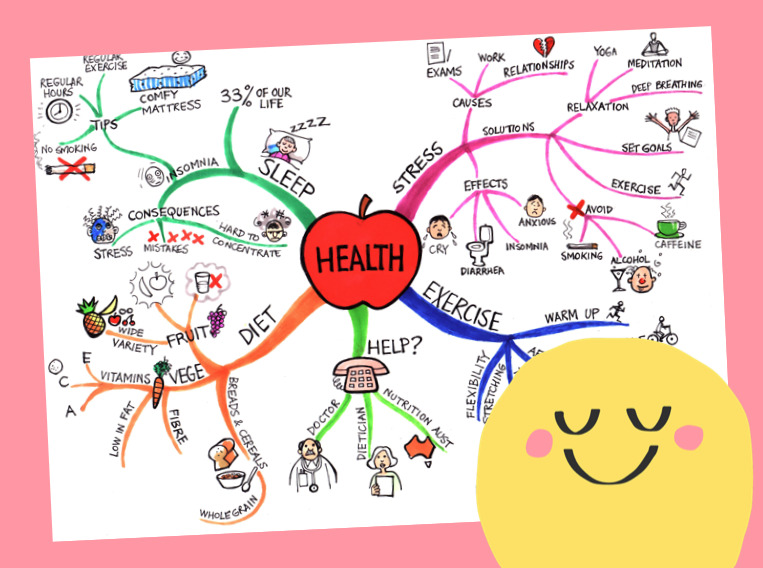
When you start using this strategy, it can feel clunky and awkward. It requires some mental effort to get going.
Why can it feel hard to start mind mapping?
Because it isn’t a habit (not yet, anyway). But once mind mapping becomes a habit, it can feel easy and deeply rewarding.
So, how do you get to that point where mind mapping feels easy? Even fun?
In this article, I will explore how you can create a habit of mind mapping. I’ll show you how to remove friction or pain points so it’s much easier to put pen to paper and absorb ideas.
Let’s start by looking at what gets in the way and stops many people from creating mind maps in the first place. I’ll also share some strategies you can use to overcome each of these barriers.

When you look at a mind map with all the pictures and different colours, it seems like something that would take a fair amount of time and effort to create.
If you’re comparing mind mapping to the time it takes to read your book passively, then yes, mind mapping will take more time. But you need to understand that reading your book passively is not an effective way to learn. In contrast, mind mapping is super effective.
People often fall into the trap of trying to make their mind maps look like works of art. Try lowering your standards and allowing yourself to make a mess when you mind map. This will speed up the process.
Another time trap is trying to mind map as you read and trying to mind map everything you read. I find it’s much faster to read and tab key ideas worth mind mapping later on. Once I’ve finished reading either the chapter or book, I then commence the mind mapping process. By this stage, I have a better understanding of the key ideas and what’s worth mind mapping.
Some people get hung up on the way their mind maps look. They can’t stand looking at messy pictures and scribbled words. If that’s you, perhaps you could take your drawing skills to the next level with some practice and sketch classes. But it’s not necessary.
Mind maps are not there to look pretty. They are there to help you learn. I am a big fan of badly drawn mind maps. If you look at my mind maps from university, they’re not works of art but they contain loads of important ideas. And that’s what matters most when it comes to learning.
Here’s a simple hack: invest in a set of nice, vibrant coloured pens. A bit of colour on the page will make your mind maps more visually appealing.

Mind mapping is straightforward. You draw a central image, curved lines, a few pictures, and write down key ideas. That’s it!
It’s not something you need to read a book about. You don’t need to enrol in a 10 week program to learn how to do this.
If you want some tips on how to mind map, check out my free Mind Mapper’s Toolkit. It’s a quick and easy read.
It’s important to realise that the first time you engage in any new behaviour, it will most likely feel strange and uncomfortable. You may feel a bit clumsy and awkward. You may have questions, “Am I doing this right?”. All of this is normal and to be expected.
Even something as simple as the pen you mind map with can make or break the mind mapping process.
You’ve probably noticed that some pens don’t feel pleasant to write or draw with. For instance, I’m not a fan of the popular Sharpie pen range. I don’t like the way these pens bleed through the page. And I really don’t like the way they smell.
These may seem like minor irritations and quirks, but trust me, they’re not. Your mind mapping experience will be diminished by a pen that doesn’t feel good in your hand or on the page. And any behaviour that feels unpleasant is much harder to sustain.
I’ve since ditched my Sharpie pens. I mind map with a uniball signo pen and non-toxic Tombow paintbrush pens. As far as coloured pens go, I won’t lie, these pens are pricey! But you can find them online for $25 cheaper than in Officeworks (a big stationery store in Australia).
What I love about these pens is that they are super easy to use, feel lovely to strike across the page, and they won’t leave you with a splitting headache from the ink smell.
Here are some things that have helped me to establish this habit in my life:
When is the best time for you to mind map? Where in your day can you easily slot in a 15 minute mind mapping session?
I like to mind map when I feel fresh and mentally alert (first thing in the morning).
Find an activity that you do every day without fail (e.g., having a shower, eating breakfast or dinner) and use that to prompt you to start a mind mapping session.
For instance, after I have completed my morning routine (workout, breakfast and shower), that’s my cue to sit down and start mind mapping.
Before you start your session, set yourself up with everything you need to mind map. I like doing this the night before my morning mind mapping sessions.
Before I go to bed, I lay out a sheet of A3 paper, my pens, and my timer. The book I am mind mapping is open on the page where I need to start working. The next day, all I need to do is sit down, start my timer, pick up a pen, and away I go!

What’s one thing that can slow down the mind mapping process?
For me, it’s digital distractions (e.g., text messages and notifications).
You probably already know the things that tend to derail you. Create a barrier between you and those things.
For example, my phone is the biggest distraction for me. How do I deal with this? Before I start mind mapping, I take my phone and place it away from my body in another room.
This signals to my brain that my phone is off-limits and it’s time to knuckle down and focus on my work.

Don’t wait until you feel pumped and inspired to create a mind map. Set a timer for 10-15 minutes and start mind mapping (regardless of how you feel).
If you miss a day, don’t beat yourself up. It’s no big deal. Just say to yourself, “Tomorrow is a new day. I will get back into mind mapping then”.

When the timer goes off at the end of your mind mapping session, say to yourself, “Good job!”. Do anything that makes you feel instantly good. I often clap my hands or do a fist pump.
According to Professor BJ Fogg, the secret to wiring in any new habit is to release a positive emotion within milliseconds of engaging in the new behaviour. When you release positive emotions, this releases dopamine in your brain. This makes it more likely that you’ll engage in this behaviour again.

I mentioned this before, but it’s important to repeat it: don’t go cheap with your mind mapping tools. Invest in good pens and paper. My favourite pens for mind mapping are uniball signo pens (0.7 tip) and Tombow paintbrush pens. Regarding paper, I love using Rhodia paper (it feels like your mind mapping on butter).
It may sound a little dramatic, but mind mapping changed my life. I used to read books and then feel frustrated that I couldn’t retain much information. But now, I have a strategy I can easily use to help me understand and remember complex ideas. This gives me confidence when it comes to learning new skills and information.
I encourage you to be playful with this strategy. Don’t get too hung up on how your drawings look. Your top priority is to leave perfectionism at the door and have some fun. Because when it comes to mind mapping, done is better than perfect.
Dr Jane Genovese delivers interactive and engaging study skills sessions for Australian secondary schools. She has worked with thousands of secondary students, parents, teachers and lifelong learners over the past 15 years.
Get FREE study and life strategies by signing up to Dr Jane’s newsletter:
© 2025 Learning Fundamentals